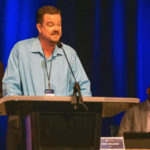After extensive debate, messengers to the Southern Baptist Convention approved resolutions about integrity in leadership, religious liberty, support for Israel and in vitro fertilization.
The Committee on Resolutions brought 10 of 27 properly submitted proposed resolutions for consideration to messengers of the Southern Baptist Convention annual meeting, spread out over three business sessions.
The committee published their proposed resolutions May 31, with a change enacted at the 2023 meeting to bylaw 20 of the SBC constitution to give at least 10 days to consider the resolutions in a preliminary report prior to the annual meeting, Kristen Ferguson, committee chair from California, said.
Without specifically naming any individuals but calling to mind the failure of recent leaders in Southern Baptist life including Paige Patterson, Paul Pressler, Johnny Hunt and others, Resolution 1 addressed “Integrity in SBC Leadership.”
It proposed calling sinful leaders to repentance and removing themselves from ministry positions “to pursue conciliation” where “disqualifying sin” has been committed.
In the event leaders who’ve committed disqualifying sins do not remove themselves from positions of ministry, the resolution calls on Southern Baptist churches to subject those leaders to church discipline.
Stephen Owensby from Gaffney, S.C., proposed an amendment that added: “Whereas, the Apostle Paul models for leaders how to biblically acknowledge imperfections through confessing pride, pleading with the Lord for help, trusting his grace to be sufficient in weakness and proclaiming God’s strength even as we are weak. 2 Corinthians 12:7-10.”
The committee found this amendment to be friendly, and it was adopted without objection.
Jolee Sisney from Kansas City, Mo., attempted to amend the resolution by including a reference to an amicus brief filed by lawyers for the SBC Executive Committee, Southern Baptist Theological Seminary and Lifeway Christian Resources. The brief was aimed at limiting liability for sexual abuse claims.
Sign up for our weekly edition and get all our headlines in your inbox on Thursdays
The committee considered the amendment unfriendly because what they provided was “a generic resolution about a pattern of behavior, not targeting one specific thing,” the committee member presenting the resolution, Byron McWilliams of Odessa, said.
Sisney defended the amendment, saying it offered “a small opportunity for messengers to speak to the filers of the amicus brief.” She said some of them had not yet spoken about it, even though the filing “blind-sided” and “devastated” many in the SBC. Her amendment failed.
Separately, a motion to censure signers of that brief—Lifeway CEO Ben Mandrell, SBC President Bart Barber and Southern Seminary President Al Mohler—was brought to the floor but defeated.
Religious liberty debate
Resolution 2, “On Defending Religious Liberty,” called for upholding historic Baptist principles on religious liberty, in response to growing Christian nationalist movements, although it did not use that term.
Messengers who disagreed with several points of the resolution said it was too murky to be helpful; that Jesus is the ruler of kings on earth, so the nation is obligated to confess Jesus is Lord; and it left room for antisemitism or restrictions on Southern Baptists proclaiming God’s word.
Dusty Deevers, an Oklahoma state senator, called for “a point of order and division of the room” in contest of the vote count on a proposed amendment by James Mitzenmacher of Florida.
Mitzenmacher, who noted he is ethnically Jewish, presented an amendment to “steadfastly oppose all legislation that would designate any portion of the Holy Bible as hate speech, or impose any restriction on proclaiming God’s word, or otherwise stifle the religious liberty of Southern Baptists.”
Bart Barber explained Deevers’ “division of the house” motion was in order and meant that the vote would be retaken, by standing instead of by raised ballot.
The vote still showed the amendment had failed to pass from his perspective, Barber continued. But, he advised Deevers he could call for a marked ballot vote if he was still not satisfied with the count.
A clear majority opposed Devers’ motion for a marked ballot. So, after a requested parliamentary ruling concluded the vote against the amendment stood, Resolution 2 was adopted as worded in the SBC Daily Bulletin.
Just War debate
An amendment by James Ag from Ohio to correct a Scripture reference to Matthew 24:6 from Matthew 26:4 on Resolution 3, “On Just War and Pursuit of Peace,” was received as friendly and approved.
The messenger from Ohio proposed several additional changes, noting it is “nonsensical to say we dropped a bomb on people because we love them.” His proposed amendments ultimately were voted down, and the resolution passed with the amended Scripture reference.
Noting the lack of pre-filed amendments related to several resolutions, Barber and the committee proposed dealing with four of them at one time to speed up the process.
The convention agreed to approve three of the four by general acclamation: Resolution 7, “On the God-Given Rights and Responsibilities of Parents;” Resolution 9, “On Evangelism and the Great Commission;” and Resolution 10, “On Appreciation for Indianapolis.”
Resolution 8, “On the Danger of Abusing Non-Disclosure and Non-Disparagement Agreements,” was pulled from the group approval set when objections to it were noted.
Messengers robustly discussed Resolution 4, “On Justice and Peace in the Aftermath of the Oct. 7 Attack on Israel.” It denounced Hamas and urged Southern Baptists to be united in support of the nation of Israel, opposing any call for a permanent cease-fire until all hostages are released.
Messengers voted down an amendment by Braden Hodgekiss of Florida, the committee had deemed friendly. It removed the language “since God called them as his people” and added “we especially pray” in acknowledgement of Palestinian and Jewish Christians.
Ferguson moved to accept Resolution 6, “On the Ethical Realities of Reproductive Technologies and the Dignity of the Human Embryo.”
IVF debate
Daniel Taylor proposed a pre-filed amendment to soften the language of the resolution to be sensitive to Christians whose families have been built through IVF. He passionately spoke to his amendment, telling the story of his godson who would not have been born without IVF.
Ferguson responded that while his story pointed to the need for sensitivity in this conversation, the committee had taken all of it into consideration in their draft and did not consider the amendment to be friendly.
The resolution passed without amendment despite impassioned pleas from an additional messenger who personally was indebted to IVF for the birth of his children and grieved to have messengers affirm a resolution which he said paints IVF as an evil.
The resolution stated: “In Vitro Fertilization most often participates in the destruction of embryonic human life and increasingly engages in dehumanizing methods for determining suitability for life and genetic sorting, based on notions of genetic fitness and parental preferences.”
It also asserted “between 1 million and 1.5 million human beings are currently stored in cryogenic freezers in an embryonic state throughout the United States, with most unquestionably destined for eventual destruction.”
The adopted resolution called on Southern Baptists “to reaffirm the unconditional value and right to life of every human being, including those in an embryonic stage, and to only utilize reproductive technologies consistent with that affirmation especially in the number of embryos generated in the IVF process.”
















We seek to connect God’s story and God’s people around the world. To learn more about God’s story, click here.
Send comments and feedback to Eric Black, our editor. For comments to be published, please specify “letter to the editor.” Maximum length for publication is 300 words.